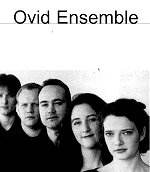Having enjoyed this group at South Bank Centre in January [PLG Young Artists 2000 14 January] I was pleased to be able to hear part of their debut concert at Wigmore Hall. I had the opportunity beforehand also to talk with Alan Hoddinott, who had been prompted to compose a quintet for after being impressed previously by their oboist Alun Darbyshire. He had found writing for oboe, string trio and piano an interesting challenge.At rehearsal of his new work (the ink scarcely dry) Hoddinott had admired the Ovid Ensemble's virtuosity in coping with music made deliberately difficult, written to celebrate the technical skills of today's young musicians. His Doubles was in two longish main movements, with various changes of tempo, which were not made at all clear in the listing. Having traversed the scheduled Presto & Allegro of the first, we arrived without a break at an extended passage of slow music, followed by a pause after which I expected the concluding Allegro. But no, this was another slow section, which offered continuity, rather than needed contrast at that point. The work started off intriguingly, with lively rhythmic interplay and skilful deployment of the unusual instrumental line up, but for me some of the slower music outstayed its welcome.
The programme on the flyer, grandly described as a brochure, was variously deficient and was in need of proof reading. Ovid might do well to take over this aspect of presentation themselves. There were no programme notes whatsoever, no dates of composers or compositions, nor even a verbal explanation that Haydn's Oboe Quartet was actually a string quartet, the first violin part taken on oboe. I looked through New Grove's forty pages of Haydn listings (would you believe it?) but failed to spot an oboe quartet, not even under doubtful and spurious arrangements, but the plethora of those indicated that the Ovids were in good company! We would have been interested and were entitled to know. However, it was very well played and a refreshing change from Mozart's oboe quartet.
The other rarity was a Rhapsodie (sic) for oboe, viola and piano by Loeffler of whom most of us knew nothing; I had presumed him thereby to be a Frenchman. We were regaled with the recitation by the pianist of a poem (about a swamp, I think), not very well projected, but never a word about the mystery composer! The piece sounded late-nineteenth century-ish, well set for the three instruments, but with over-extended sections and lots of piano flourishes and arpeggios - Loeffler seemed to have real difficulty in deciding how to stop.
One was left with little curiosity to explore other music by this gentleman, but New Grove came to the rescue of Seen&Heard's readers yet again with a fascinating essay about Charles Martin Loeffler (1861-1935), a fastidious American minor composer of German parentage, everything he wrote 'fashioned with skill and sensitivity'. He was assistant leader of the Boston Symphony Orchestra, a polymath who led 'a seigneurial existence, enjoying riding thoroughbred horses and epicurean cuisine'! There are two Rhapsodies (1901, arranged from songs) for this combination and they are recorded on [Delos DE3136].
The performances were well prepared and Ovid should continue to explore diverse programming, but perhaps with more thought about ordering items; Alun Darbyshire took part in every item in the first half and in the Britten Phantasy Quartet immediately after the interval, earning himself a rest for Schumann's piano quartet, which completed the programme.
Peter Grahame Woolf

 Return to:
Return to: